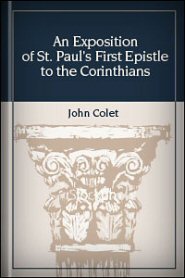Classic Commentaries and Studies on 1 and 2 Corinthians (49 vols.)
Digital Logos Edition
Overview
This massive 49-volume collection features a variety of the most notable studies on Corinthians from the Reformation to the early twentieth century. With scholars such as William Milligan, James Moffatt, E. P. Gould, John Calvin, and Charles Hodge, Classic Commentaries and Studies on 1 & 2 Corinthians provides over 14,000 pages of critical interpretation, exegetical studies, thematic elements, semantic discourse, doctrinal interpretation, and practical application. This 49-volume set offers a solid foundation for biblical interpretation and practical application through expositional scholarship.

- Over 14,000 pages of notable scholarship on 1 and 2 Corinthians
- Influential and focused historical commentaries on Corinthians
- Completely searchable, linked to your preferred Bible translation and the other books in your library
- Title: Classic Commentaries and Studies on 1 & 2 Corinthians
- Volumes: 49
- Pages: 14,882
- Resource Types: Commentaries, Monographs, Lectures
- Topic: 1 & 2 Corinthians
- Commentary on the Epistles of Paul to the Corinthians, vol. 1 by John Calvin
- Commentary on the Epistles of Paul to the Corinthians, vol. 2 by John Calvin
- St. Paul’s First Epistle to the Corinthians by Charles J. Ellicott
- Historical Commentary on the Epistles to the Corinthians by William Mitchell Ramsay
- An Exposition of the First Epistle to the Corinthians by Charles Hodge
- An Exposition of the Second Epistle to the Corinthians by Charles Hodge
- Commentary on the First Epistle of St. Paul to the Corinthians, vol. 1 by Frédéric Louis Godet
- Commentary on the First Epistle of St. Paul to the Corinthians, vol. 2 by Frédéric Louis Godet
- The First Epistle to the Corinthians by H. L. Goudge
- An Exposition of St. Paul’s First Epistle to the Corinthians by John Colet
- The First Resurrection: Being Comments on First Corinthians Chapter 15 by Robert Noble
- The Resurrection of the Dead: An Exposition of 1 Corinthians 15 by William Milligan
- Christ Crucified: Lectures on 1 Corinthians 2 by Adolph Saphir
- Charity: As Delineated in the Thirteenth Chapter of the First Epistle to the Corinthians by James Gisborne
- Everything in Christ: An Exposition of First Corinthians 1:30 by E. P. Rogers
- The Church and Modern Problems in the Light of the Teaching of Paul in the First Corinthians by P. B. Fitzwater
- The Fifteenth Chapter of St. Paul’s Epistle to the Corinthians, Explained and Illustrated in a Series of Sermons by Thomas Ainger
- The Mind of a Master Builder: An Interpretation of St. Paul’s First Letter to the Corinthians by Henry Bickersteth Durrant
- A Commentary on the First Epistle to the Corinthians by Thomas Charles Edwards
- The First Epistle of Paul to the Corinthians by James Moffatt
- Pauline Charity: Discourses on the Thirteenth Chapter of Saint Paul’s First Epistle to the Corinthians by Joseph Cross
- Christian Charity Explained by John Angell James
- The First Epistle to the Corinthians with Explanatory Notes and Appendix by Henry Linton
- The Second Epistle of Paul to the Corinthians: A Study in Translations and Interpretation by Wilfrid H. Isaacs
- "The Fruits of Penitential Sorrow." A Series of Lectures on 2 Corinthians 7, 10, and 11 by Robert Liddell
- The Second Epistle to the Corinthians by Arthur Crosthwaite
- The Second Epistle of the Apostle Paul to the Corinthians by Allan Menzies
- The Second Epistle of Saint Paul to the Corinthians with Introduction and Notes by R.D. Byles
- The First and Second Epistles to the Corinthians, with Notes Critical and Practical by M. F. Sadler
- Expository Lectures on St. Paul’s Epistles to the Corinthians by F. W. Robertson
- Commentary on the Epistles to the Corinthians by E. P. Gould
- Epistles to the Corinthians by James Riggs and Harry Lathrop Reed
- The Epistles to the Corinthians with Notes and Comments by John Edgar McFadyen
- A Commentary on the Epistles to the Corinthians, vol. 1 by Gustav Billroth
- A Commentary on the Epistles to the Corinthians, vol. 2 by Gustav Billroth
- St. Paul’s Epistles to the Corinthians: An Attempt to Convey Their Spirit and Significance by John Hamilton Thom
- Apostolic Christianity: Notes and Inferences Mainly Based on S. Paul’s Epistles to the Corinthians by H. Hensley Henson
- Notes and Reflections on the First Epistle to the Corinthians by Arthur Pridham
- Notes and Reflections on the Second Epistle to the Corinthians by Arthur Pridham
- A First Century Letter: Being an Exposition of Paul’s First Epistle to the Corinthians by Nathaniel Micklem
- Notes on the First Epistle of Paul the Apostle to the Corinthians by William Kelly
- Notes on the Second Epistle of Paul the Apostle to the Corinthians by William Kelly
- The Charter of the Church by John R. Caldwell
- The Epistles of St. Paul to the Corinthians: Revised Notes of an Exposition of the First Epistle to the Corinthians by Gerald H. Rendall
- The First Epistle to the Corinthians: A Study Personal and Historical of the Date and Composition of the Epistles by Marcus Dods
- The Second and Third Epistles of St. Paul to the Corinthians: With Some Proofs of Their Independence and Mutual Relation by James Houghton Kennedy
- Annotations on St Paul’s First Epistle to the Corinthians: Designed Chiefly for the Use of Students of the Greek Text by Thomas Williamson Peile
- Annotations on St Paul’s Second Epistle to the Corinthians: Designed Chiefly for the Use of Students of the Greek Text by Thomas Williamson Peile
- Expository Lectures on Paul’s Epistles to the Corinthians by William Lothian
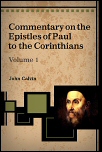
Commentary on the Epistles of Paul to the Corinthians, vol. 1
- Author: John Calvin
- Translator: John Pringle
- Publisher: Calvin Translation Society
- Publication Date: 1848
- Pages: 474
Calvin’s Commentaries are, in the words of Philip Schaff, one of the few exegetical works that have outlived their generation. Calvin preached and wrote prolifically on the Bible. His commentaries display a rare combination of exegetical insight, pastoral concern, and theological depth which have inspired generations of Christians.
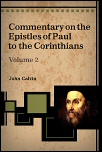
Commentary on the Epistles of Paul to the Corinthians, vol. 2
- Author: John Calvin
- Translator: John Pringle
- Publisher: Calvin Translation Society
- Publication Date: 1849
- Pages: 438
Calvin’s Commentaries are, in the words of Philip Schaff, one of the few exegetical works that have outlived their generation. Calvin preached and wrote prolifically on the Bible. His commentaries display a rare combination of exegetical insight, pastoral concern, and theological depth which have inspired generations of Christians.
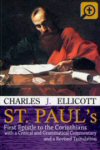
Charles J. Ellicott examines Paul’s first letter to the Corinthian church verse by verse, from the introduction to the salutation. Ellicott discusses grammatical issues in detail and also offers an exegetical message.
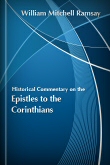
Historical Commentary on the Epistles to the Corinthians was first serialized in three issues of The Expositor from 1900 to 1901. Ramsay begins the commentary by noting the differences between the epistles to the Corinthians and the epistle to Galatians. He then provides a thorough examination of the Corinthian epistles, giving historical context for Paul’s instructions.
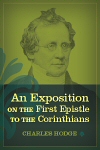
Hodge begins his commentary on 1 Corinthians with an introduction to the geographic and political significance of the city of Corinth. In particular, he shows how the history of Corinth, its relationship to the city to Athens, and the political climate of the Roman Empire contribute to the pastoral and theological controversies which Paul aims to address.
Hodge also attends to the theological implications of Paul’s pastoral concerns for the church in Corinth—issues such as church divisions, sexual immorality, marriage and divorce, idolatry, worship, spiritual gifts, and the resurrection. More importantly, Hodge argues that 1 Corinthians has made its way into the New Testament canon because Paul’s words on these theological and pastoral issues are fit not only for his original readers, but also for the entire history of the church. This commentary on 1 Corinthians serves as an important first step toward hearing those words.
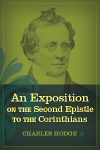
Hodge continues his commentary on Paul’s correspondence with the church in Corinth. In this volume, he addresses Paul’s journeys, the new covenant, the resurrection, reconciliation, idolatry, repentance, generosity, and suffering.
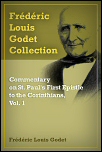
The first epistle to the Corinthians directly addresses core issues in the church—then and now—and answers crucial questions about its theology. This book’s practicality and theological wisdom, as well as its historical parallels with issues facing the contemporary church make it vital reading for modern Christians.
Volume one of Godet’s commentary on 1 Corinthians includes a lengthy introduction to the epistle as a whole, along with detailed commentary of the first six chapters. Godet devotes particular attention to the historical situation of the church in Corinth, church discipline, impurity, and marriage. Throughout his commentary, Godet—departing from the dominant trend in nineteenth-century biblical criticism—does not sacrifice sound exegesis and interpretation to conform to the standards of historical, textual, and modernist criticism.
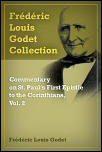
This volume continues Godet’s commentary on 1 Corinthians. He devotes significant attention to Paul’s advice to the church in Corinth regarding the role of women in public worship, the celebration of the Lord’s Supper, and spiritual gifts—issues which remain at the center of church controversies 2,000 years later. Godet closes his commentary with a detailed exposition of chapter 15 and the resurrection of the body. This volume also includes chapters on the historicity of 1 Corinthians, the ecclesiastical offices of the church in Corinth, and the criticism of the text.
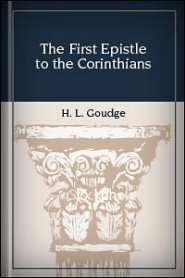
H. L. Goudge’s The First Epistle to the Corinthians provides in-depth exegetical studies on the First Epistle to the Corinthians—in such a way that both clergy and laity can move to advance their understanding of critical principles.
H. L. Goudge served as Regius Professor of Divinity at Oxford from 1923 until 1938.
This volume contains a series of sixteen lectures on the First Epistle to the Corinthians that were delivered to Oxford University by John Colet. Colet includes detailed exegesis of key themes and perspectives, as well as provides annotative summaries of the text.
John Colet (1467–1519) was a notable English scholar and Theologian. Educated at St. Anthony’s School and Oxford, Colet went on to found St. Paul’s School in 1512.
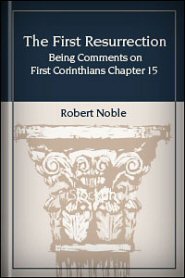
Robert Noble articulates the critical interpretation of First Corinthians 15, verse-by-verse, through examination and annotation of the text. Noble examines the resurrections’ place in relation to eschatology by drawing upon other Scripture.
Robert Noble was educated at Cambridge before becoming a missionary to Masulipatam, India.
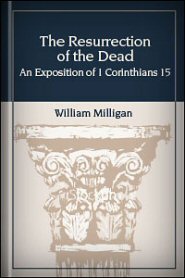
William Milligan builds a foundation for studies of the Resurrection in his The Resurrection of the Dead by systematically distilling interpretation and illumination. Milligan examines the Resurrection in the early church and Gnostic environments, and seeks to provide comprehensive examination of the Resurrection’s doctrinal interpretation over the centuries.
It is a great deal more than a mere commentary. It shows a wise perception of the state of mind with which many readers will use. It is full of most varied and suggestive thoughts. But while this is so, Dr. Milligan does not forget that the work he has in hand in the explanation of the meaning of the teaching of St. Paul...
—The Church Quarterly Review
William Milligan (1821–1892) was a notable Scottish theologian. Educated at the University of Halle in Germany, Milligan went on to write several books and to teach at the University of Aberdeen in Scotland.
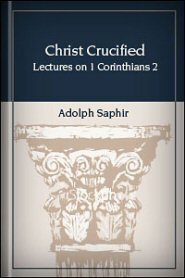
Originally a set of thirteen lectures, Adolph Saphir’s Christ Crucified: Lectures on 1 Corinthians 2 examines the testimony and power of the crucifixion. Saphir explores the biblical events leading up to, and the events surrounding that appointed time.
These lectures are devout, fervent, and replete with love for Christ. They are well adapted to promote a warm and earnest piety.
—Evangelical Magazine
We have rarely met in our works of modern theology a volume more characterized than this by the essence of the gospel of Christ.
—Christian Standard
Adolph Saphir (1831–1891) was a notable Jewish theologian from Pesth, Hungary. Educated at Glascow University, University of Aberdeen, University of Edinburgh, and the Free Church College in Edinburgh—Saphir went on to greatly influence the western understanding of Jewish culture and literature.
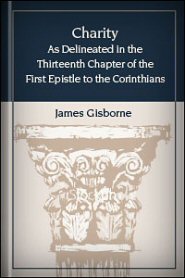
James Gisborne examines the concept of charity within biblical terms—and how Christian character should manifest into action. This volume includes comprehensive studies on the ultimate example of charity, Christ.
James Gisborne M.A. became Vicar of Croxall, Burton-on-Trent in 1820.
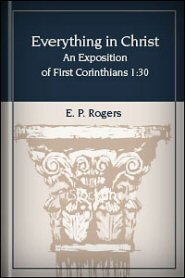
Rogers provides the audience with a thorough explanation and exegetical studies on the concepts of righteousness, sanctification, and redemption as found in 1 Corinthians 1:30.
E. P. Rogers (1817–1881) was educated at Yale and Princeton Theological Seminary. He went on to pastor multiple churches in Massachusetts, Georgia, Philadelphia, and New York.
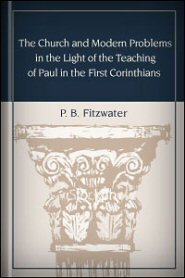
In these transcripted lectures, P. B. Fitzwater conveys crucial relationship between modern problems and thematical elements found in First Corinthians. He builds a foundational framework for unfolding key principles and applying them to everyday life.
The[se] lectures were most favorably received by large and appreciative audiences, and this volume will carry them to a wider constituency.
—The Bible Institute Colportage Association of Chicago
P. B. Fitzwater was Professor of Systematic Theology at Moody Bible Institute, Chicago for forty-one years.
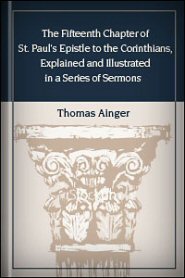
In this series of transcripted sermons from Lent, Ainger provides an illuminating interpretation of the resurrection based off of scripture. He focuses on 1 Corinthians 15 with a distinctive reverence for contemporary doctrine, in conjunction with coherent discussion and efficacy.
Thomas Ainger (1799–1863) was educated at Norwich Grammar School and St. John’s College, Cambridge. He went on to found schools in Hampstead, London as well as to pastor several churches.
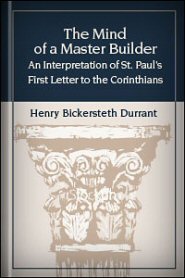
In The Mind of a Master Builder, Henry Bickersteth Durrant explicitly outlines key themes throughout the book of First Corinthians. From testing human character to fulfilling vital functions in the Body of Christ—Durrant concisely renders the intended messages from Paul to contemporary application.
Henry Bickersteth Durrant (1871–1932) was educated at Cambridge before becoming the Bishop of Lahore in 1913.
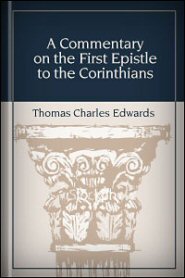
In Edwards’ A Commentary on the First Epistle to the Corinthians, he seeks to provide exegetical studies on scripture and doctrine that are easily overlooked. Edwards draws upon Charles Hodge and Dean Stanley to validate his theological assertions.
Thomas Charles Edwards (1837–1900) was educated at Lincoln College, Oxford before becoming the first Principal of Aberystwyth University in 1872. He later went on to become the head of Bala Theological College—of which his father had earlier founded.
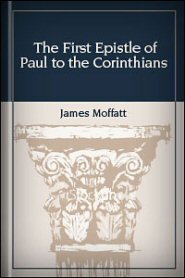
James Moffatt’s commentary on First Corinthians asserts practical and necessary interpretation of the original texts. Moffatt states that the early church was focused on establishing doctrine, rather than concerning itself with engaging commentary. This commentary is the bridge between established doctrine and coherent commentary for the Epistle of First Corinthians.
James Moffatt (1870–1944) was educated at Glasgow University and went on to become Professor of Greek and New Testament Exegesis at Oxford in 1911. A short while later, Moffatt accepted the position of Professor of Church history at the United Free Church College. Moffatt’s utmost ambition was to provide an easily readable Bible. His contributions included paraphrased translations for coherent understanding.
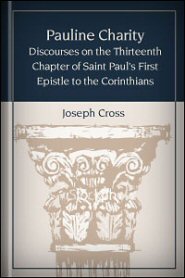
Joseph Cross’s Pauline Charity includes discourses on the different character traits needed for genuine charity, as found in the Pauline epistles. Cross frequently references biblical and non-biblical sources to provide a uniform message of biblical love.
These are clear, instructive, thoroughly evangelical, and highly edifying. They will serve as good models for young ministers, in style, spirit, and directness of address.
—Lutheran Observer
Joseph Cross D.D, L.L.D, is best known for his compilation of sermons entitled Coals from the Altar.
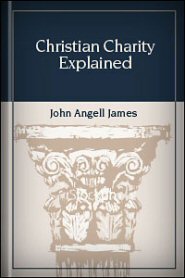
John Angell James aims to further define the need for Christian charity as a form of love. He provides distinguished examples from scripture to buttress common themes of charity throughout the gospel—as well as relates love with exegetical analysis of atonement, grace, and virtue.
Such a book as this was greatly needed; and we are truly glad to find that it has been supplied by a writer so wise and enlightened as Mr. James.
—The Evangelical Magazine and Missionary Chronicle
John Angell James was educated in Gosport, Hampshire before accepting a position in Birmingham as a Preacher. James published several writings including The Anxious Inquirer and An Earnest Ministry.
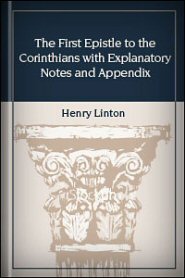
This commentary on First Corinthians aims to aid the reader in critically understanding the text. The author provides thorough background analysis on the setting and historical events, then proceeds verse-by-verse through the epistle.
Henry Linton (1879–1958) was educated at Durham University before going to become the Vice-Principal of the CMS Training College in Oyo—as well as the Principal of Stuart Memorial College. Linton was ordained as the Bishop of Persia in 1919.
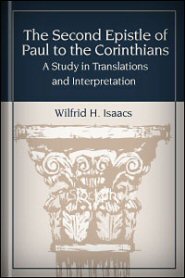
In this volume, Wilfrid H. Isaacs comprehensively examines the semantics of Second Corinthians in order to provide the reader with a more accurate interpretation of the original text. Isaacs covers etymology to convey the inherent change in meaning over time, as well as the exegetical implications of change.
Much work has gone to the composition of this book, and it repays close study
—The Hibbert Journal
Wilfrid H. Isaacs was Headmaster of Trent College from 1890 to 1895.
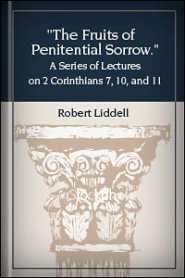
Theses lectures cover select chapters in Second Corinthians while exploring the operation of righteousness and grace from genuine repentance. Liddell defines what constitutes genuine sorrow, and relates practical studies of sanctification through thought-provoking discourse. Includes the preliminary discourse The Love of Christ Constraining Us.
Robert Liddell (1808–1888) received his M.A from Oxford before later being ordained Vicar for St. Paul’s in Knightabridge.
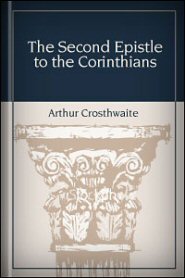
After a thorough introduction to the historical background, Crosthwaite conveys the necessity of taking the Second Epistle of Corinthians as seriously as the First. He indicates that it is not widely cited by the early church fathers, and offers meaningful examination of the text.
Arthur Crosthwaite was Lord Mayor of Liverpool from 1900 to 1901.
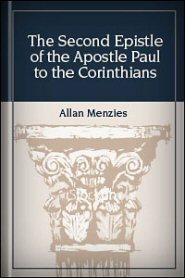
Allan Menzies provides an adept commentary on Second Corinthians by utilizing intensive study, interlinear translation, and exegetical semantics. Menzies goes on to thoroughly defend the English translations on behalf of his own extensive work in translation and semantic discourse.
Professir Menzies has rendered a great service to all English-speaking students of the Bible by the publication of his brief commentary on Second Corinthians.
—Harvard Theological Review
Allan Menzies (1845–1916) was Professor of Divinity at the University of St. Andrews in Edinburgh, Scotland.
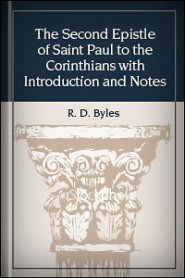
Filled with a detailed exposition and background on the epistle, Byles’ commentary explores the Second Epistle to the Corinthians exegetically verse-by-verse. He provides prodigious clarification on the cultural and historical setting—allowing the reader to have a more informed and comprehensive paradigm while learning.
R. D. Byles (1870–1912) was educated at Leamington college, Rossall School, and Oxford. Following his Bachelor’s, he converted to Catholicism and studied at Beda College in Rome. Ordained in 1902, he died aboard the Titanic while helping many third-class passengers board life boats.
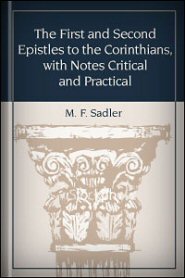
In this extensive commentary, Sadler explores the Epistles to the Corinthians through critical exegetical studies that focus on practical explanation and detail. M. F. Sadler’s notes are considerably broad, while referencing early church and Greek writings for further clarification.
Mr. Sadlers excellent qualities as a theological writer and expositor are so well known that we need only introduce the reader to this . . .
—Church Bells
M. F. Sadler (1819–1895) was educated at Sherborne School and Cambridge, before going on to be ordained as Vicar of Bridgewater in 1857. Sadler then assumed the position Rector of Honiton from 1869 until 1895. He is widely noted for his works on theology and doctrinal tracts.
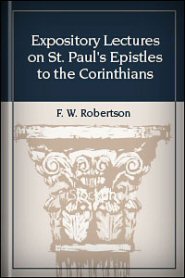
Taken from a series of lectures, F. W. Robertson comprehensively examines not only the text itself; but the national policies, historical context, implications of religious duties, and contributing factors to the ancient world in Corinth. This extensive volume provides expositional studies on the Epistles to the Corinthians as well as a distinct synopsis of the period.
These. . . [are] a welcome gift it will be to many an intelligent and devout mind. There are few of our modern questions, theological or ecclesiastical, that do not come up for discussion in the course of these Epistles to the Christians at Corinth.
—The British Quaterly Review
F. W. Robertson (1816–1853) was educated at The University of Edinburgh and Oxford, before accepting a commission in the British army. He was then ordained by the Bishop of Winchester while going on to pastor Holy Trinity Church in Brighton, UK.
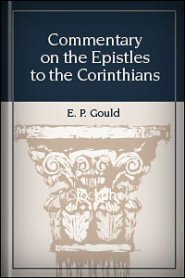
E. P. Gould provides a clear exposition of the Epistles to the Corinthians while offering critical explanation of the factors that the Church at Corinth dealt with. Each chapter is closely examined, with practical applications to every-day life.
E. P. Gould was Professor of New Testament Literature and Language, Divinity School of the Protestant Episcopal Church, Philadelphia.
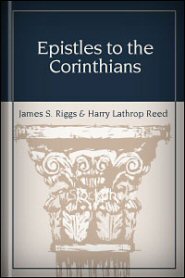
In Epistles to the Corinthians, James S. Riggs and Harry L. Reed provide detailed commentary on the Epistles in context. Preceded by a substantial critical-historical introduction, the authors include extensive notes for futher clarification and study.
[This commentary] is thoroughly adapted to the purpose proposed, viz., furnishing to ordinary as well as critical students of the Word a work which places in their hands, in un-technical language, the best results of thorough scholarship.
—The Presbyterian Quarterly
Harry Lathrop Reed received his doctorate from Auburn Theological Seminary before accepting the position of Professor in 1909.
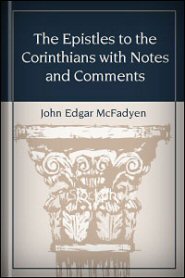
In this commentary, John Edgar McFadyen provides powerful interpretation and critical studies of the Epistles to the Corinthians through exegesis, allegorical interpretation, and textual emphasis. This massive volume includes doctrinal interpretation of the Corinthian epistles with regard for practical application.
Professor McFadyen eloquently sums up the salient features of the epistle and its elements of eternal value
—Southern Methodist Review
John Edgar McFadyen (1870–1933) was Professor of Language, Literature, and Old Testament Theology at the University of Glasgow in Scotland.
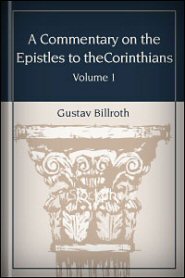
Translated from the original German by W. Lindsay Alexander, Gustav Billroth critically examines the First Epistle to the Corinthians through the use of semantic rhetoric, exegetical inquiry, and development of preceding interpretation. Billroth emphasizes grammatical elements in the original Greek that are somewhat lost in English translations for a crisper meaning.
Gustav Billroth (1808–1836) was Professor of Philosophy at the University of Halle in Germany.
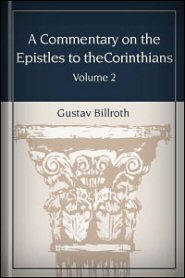
Translated from the original German by W. Lindsay Alexander, Gustav Billroth critically examines the Second Epistle to the Corinthians through the use of semantic rhetoric, exegetical inquiry, and development of preceding interpretation. Billroth explores denotative and connotative usage throughout the Epistle, as well as the implications of varying semantic meaning.
Gustav Billroth (1808–1836) was Professor of Philosophy at the University of Halle in Germany.
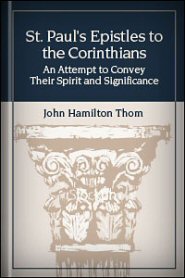
John Hamilton Thom’s St. Paul’s Epistles to the Corinthians practically examines the Epistles to the Corinthians in a direct elucidation of the original text. Thom relates the text through exploring the authenticity, origins of the text, and its’ divine revelation.
In this work, Christianity is exhibited as a spirit and a power, not as a form and a dogma. It is a revelation, not of speculative tenets to the intellect, but of moral beauty to the affections, and accomplished through the medium . . . being the most outward appeal that the spirit of God can address to the embodied spirit of man.
—An Analytical Catalogue of Mr. Chapman’s Publications, by John Chapman
John Hamilton Thom (1808–1894) was editor of the Christian Teacher. He was a visiting Professor at Manchester New College from 1866 to 1880.
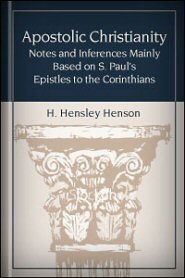
Written primarily for clarification and direct interpretation, H. Hensley Henson directs his attention to providing a commentary on the Epistles to the Corinthians that emphasizes the importance of textual meaning over clerical doctrine.
H. Hensley Henson (1863–1947) was Bishop of Durham and a member of the House of Lords from 1920 to 1939.
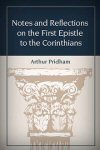
Notes and Reflections on the First Epistle to the Corinthians
- Author: Arthur Pridham
- Publisher: Longmans, Green, Reader, and Dyer
- Publication Date: 1866
- Pages: 452
Though primarily written for laity, Notes and Reflections on the First Epistle to the Corinthians offers insightful critical commentary of Scripture, making the text useful to scholars as well. Specific Scripture references are included, allowing the reader to carefully follow Pridham through 1 Corinthians.
A simple, useful volume . . . so far as we have read it, it seems to be quiet, spiritual, thoughtful, and profitable. . . . The private Christian who reads this volume, with the distinct desire to enter into this epistle, will find aids to the heart and mind, which will not be less than valuable.
—The Eclectic Review
Arthur Pridham is the author of numerous biblical commentaries, including Notes and Reflections on the Epistle to the Galatians, Notes and Reflections on Romans, Notes and Reflections on the Epistle to the Hebrews, and Notes and Reflections on the Epistle to the Ephesians.
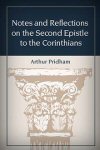
Though primarily written for laiety, Notes and Reflections on the Second Epistle to the Corinthians offers insightful critical commentary of Scripture, making the text useful to scholars as well. Specific Scripture references are included, allowing the reader to carefully follow Pridham through 2 Corinthians.
The main value of this work is to be found in its pious and practical ‘reflections,’ and in the clear and connected outline given of the apostle’s reasoning, and their application to the subject in hand.
—The Rock
Mr. Pridham does not pretend to critical research, but he illustrates the sacred word in a plain, practical, and devotional way; so that we doubt not the volume will be found instructive and profitable to the reader.
—Church of England Magazine
Arthur Pridham is the author of numerous biblical commentaries, including Notes and Reflections on the Epistle to the Galatians, Notes and Reflections on Romans, Notes and Reflections on the Epistle to the Hebrews, and Notes and Reflections on the Epistle to the Ephesians.
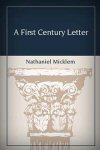
As a former student of James Moffatt, Nathaniel Micklem had access to a wealth of biblical wisdom. A First Century Letter seeks to imitate Paul’s use of common language to reveal truth and wisdom with the public as Micklem shares what he has learned through studying the works of leading theologians.
Nathaniel Wicklem (1888–1976) was a British theologian, political activist, and the principal of Mansfield College. His other work includes National Socialism and the Roman Catholic Church.
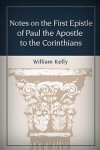
This volume contains William Kelly’s commentary on 1 Corinthians. Prior to Kelly’s notes and comments, the text includes Paul’s entire first letter to the Corinthians.
William Kelly (1823–1906) was educated at Trinity College in Dublin. He was highly involved with the Plymouth Brethren, and he served as editor for The Collected Writings of John Nelson Darby. His other works include The Second Advent of Christ Premillennial: A Reply to the Rev. D. Brown.
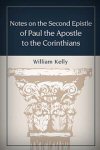
This volume contains William Kelly’s commentary on 2 Corinthians. Prior to Kelly’s notes and comments, the text includes Paul’s entire second letter to the Corinthians.
William Kelly (1823–1906) was educated at Trinity College in Dublin. He was highly involved with the Plymouth Brethren, and he served as editor for The Collected Writings of John Nelson Darby. His other works include The Second Advent of Christ Premillennial: A Reply to the Rev. D. Brown.
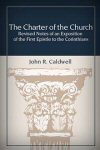
This volume presents a verse-by-verse commentary on 1 Corinthians. Caldwell draws from a wealth of theological research to present a thorough, easily-accessible analysis of Paul’s letter.
John R. Caldwell was an editor of The Witness, and the author of Foundations of the Faith, Christ in the Hebrews, and Things to Come.
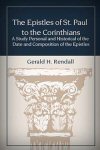
In this volume, Gerald Rendall seeks to test the cohesiveness of Paul’s letters to the Corinthians, examining them chronologically, historically, and psychologically. Rendall stresses the value of context, treating each individual verse in relation to the letters as a whole.
Gerald Henry Rendall (1851–1945) was an English educator and college administrator. He was educated at Harrow and Trinity College, Cambridge. His other works include Text and Commentary to Epistle of Barnabas, The Emperor Julian, Paganism, and Christianity, and Charterhouse Sermons.
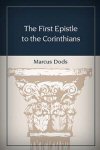
The First Epistle to the Corinthians: A Study Personal and Historical of the Date and Composition of the Epistles
- Author: Marcus Dods
- Publisher: Hodder & Stoughton
- Publication Date: 1891
- Pages: 399
In this volume, Marcus Dods offers a practical exposition of 1 Corinthians, examining Paul, the Corinthians, and the culture surrounding them.
The most varied of Paul’s epistles demands in its expositor a combination of qualities which is very rarely met with. He who would read it aright from beginning to end must be theologian, casuist, and historian all in one; he must be equally at home in the ancient and the modern Church, in ancient and in modern life. There is probably no man living in whom these characters are more at one than Dr. Dods . . .
—A Thesaurus of the Best Theological, Historical, and Biographical Literature
Marcus Dods (1834–1909) was a Scottish divine, biblical scholar, and minister of the Free Church of Scotland. His other works include The Epistle to the Seven Churches, Israel’s Iron Age, Mohammed, Buddha, and Christ, Handbook on Haggai, Zechariah, and Malachi, and How to Become Like Christ.
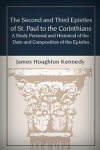
In The Second and Third Epistles of St. Paul to the Corinthians, James Houghton Kennedy argues that Paul’s letters to the Corinthians have been mistakenly identified as two letters and explains why the two books should instead be understood as three distinct writings. Using a blend of historical and contextual evidence, Kennedy pieces together the chronological story of the letters to build his case.
This is an interesting book, not merely in respect of its professed object, but also as giving the reader a glimpse into a scholar’s workshop.
—The Church Quarterly Review
James Houghton Kennedy was an assistant lecturer in divinity at the University of Dublin. He served as editor of S. Hippolytus on Daniel, and was the author of Natural Theology and Modern Thought.
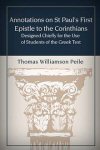
In this volume, Thomas Peile dissects the Greek text of 1 Corinthians, analyzing each verse and discussing key phrases.
Thomas Williamson Peile (1806–1882) was an author, divine, and a justice of the peace. He served as head-master of various schools, and eventually became vicar of Luton, Bedfordshire. As a scholar, he is primarily noted for his knowledge of the classics, particularly Thucydides and the Greek Testament.
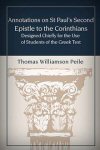
In this volume, Thomas Peile dissects the Greek text of 2 Corinthians, analyzing each verse and discussing key phrases.
Like the former portions, this volume shows signs of great care and thought . . .
—The Christian Remembrancer
Thomas Williamson Peile (1806–1882) was an author, divine, and a justice of the peace. He served as head-master of various schools, and eventually became vicar of Luton, Bedfordshire. As a scholar, he is primarily noted for his knowledge of the classics, particularly Thucydides and the Greek Testament.
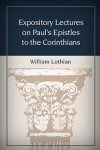
Expository Lectures on Paul’s Epistles to the Corinthians
- Author: William Lothian
- Publisher: Waugh & Innes
- Publication Date: 1828
- Pages: 552
This volume is based on a series of lectures William Lothian gave on Corinthians, fulfilling his wish that the wisdom imparted in his lectures on pastoral instruction would be accessible to the public. The text is intended to provide a balanced mix of critical analysis, commentary, and practical reflections.
The work does honor to the industry, the learning, the good sense, and the piety of its author. His style of composition is clear, correct, and simple; never mean, and sometimes very elegant.
—Evangelical Magazine
We can with all freedom recommend this work to the notice of our readers, as a clear and judicious exposition of an important portion of Scripture; and which, on account of its sound views and evangelical unction, may be read with profit by both ministers and people.
—Theological Magazine
We can cordially and confidently recommend the work to our readers, and the attention of the Christian public.
—Christian Herald
The whole exposition is excellent, containing an accurate and often critical explanation of the text, mixed with practical remarks, and breathing heart-felt piety.
—Congregational Magazine
William Lothian was a minister of the Congregational Church at St. Andrews, a teacher, and writer.
